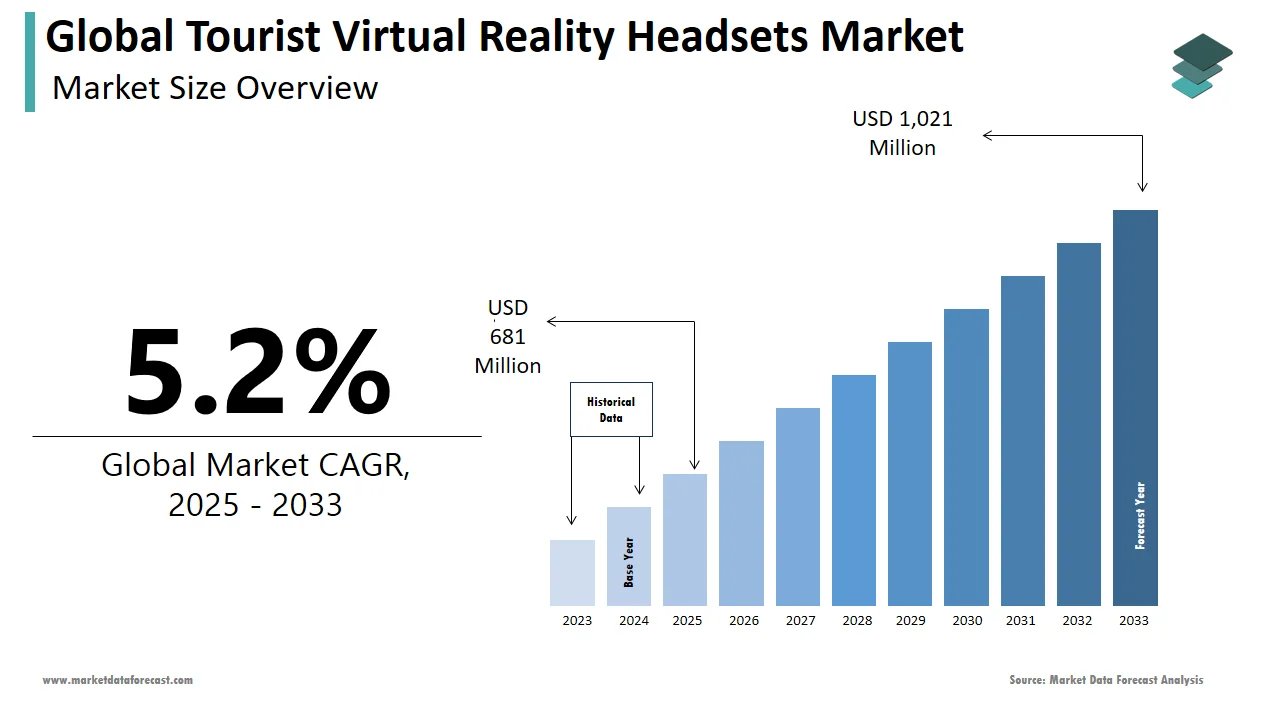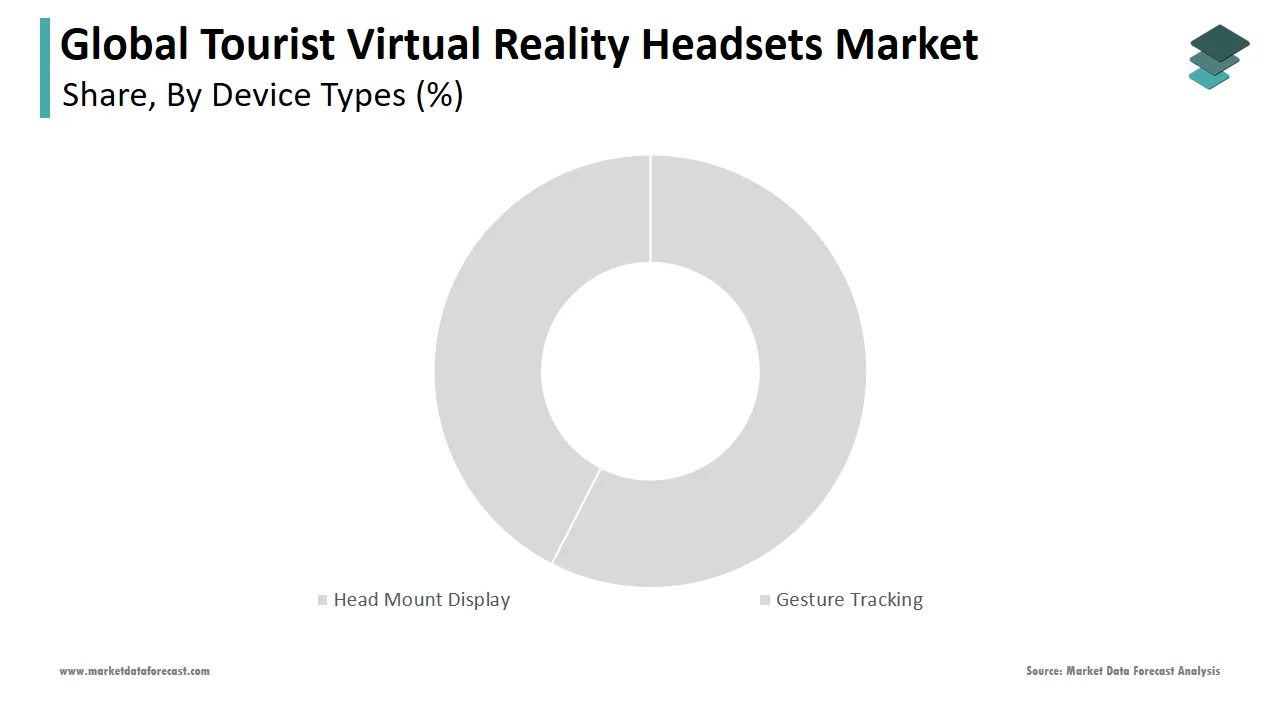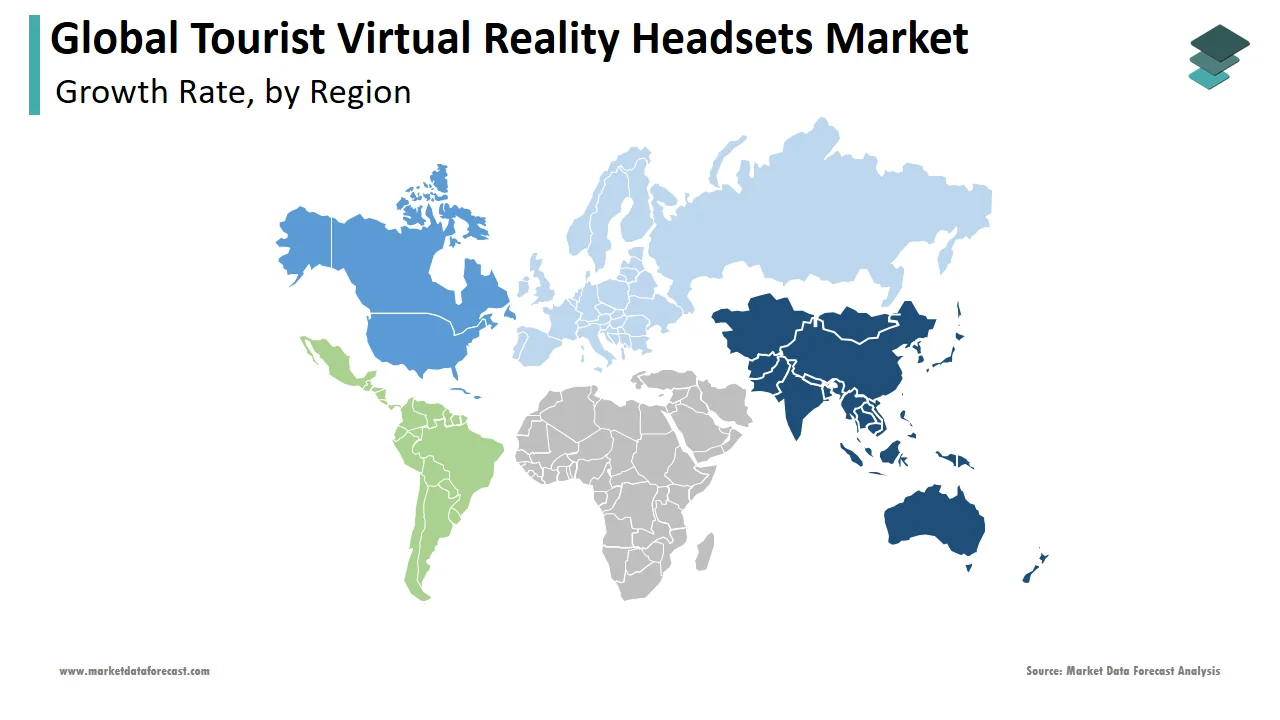Global Tourist Virtual Reality Headsets Market Size, Share, Trends & Growth Forecast Report By Device Types (Head Mount Display, Gesture Tracking), By Product Material (Metal, Fiber), By Deployment (Cloud-Based, Web-Based), By Application (Travel Agencies, In-flight Entertainment, Travel Booking Services, Hotels Tours), By Consumer Orientation (Men, Women, Children), and Region (North America, Europe, Asia-Pacific, Latin America, Middle East and Africa), Industry Analysis From 2025 To 2033.
Global Tourist Virtual Reality Headsets Market Size
The size of the global tourist virtual reality headsets market was worth USD 647 million in 2024. The global market is anticipated to grow at a CAGR of 5.2% from 2025 to 2033 and be worth USD 1,021 million by 2033 from USD 681 million in 2025.

The virtual reality landscape is rapidly growing across different industries. In the last few years, the travel sector has been progressively accepting VR technology providing tourists with never-before and special experiences throughout their journey. Moreover, the upward growth trajectory of this field in the travel industry is because of immersive marketing, in-flight entertainment, pre-trip planning and virtual destination tours.
In addition, the European Union has provided different funding options to assist tourism in generating employment and accelerating regional market development. Similarly, the EU Commission passed a proposal for developing a continent-wide system on the security of geographical indicators of non-agricultural solutions like handicrafts. These items are usually important for domestic identity and attract tourists. One of several objectives of amending the law is to fuel the area’s economy and travel and tour industry in the region. It is presently waiting for the council’s stand at first reading.
MARKET DRIVERS
The Tourist virtual reality headsets market is driven by attractive features. It assists the customers in looking at the complete picture at the time of video streaming.
Also, it captures a 360-degree image. Prominent hotel chains like Hilton, and Marriot and travel companies apply this technology to increase their customer base.
Moreover, technological developments are pushing forward the industry expansion. Modern VR products come with high-resolution screens enabling realistic views and a more detailed experience. Apart from this, haptic feedback gadgets have also considerably improved. These offer customers tactile sensations like pressure and vibrations to imitate touch and strengthen the entire digital simulation. For example, gone are the days when people searched on the internet about the destination, accommodation or transportation and building expectations far from reality. This helps the traveller to better select their location, hotel and travel plan.
Additionally, the rising desire for immersive expectation is thriving the marker further. According to a study, in 2022, more than 64 million American people used. Also, over 100 million Americans use augmented reality in 2025. AR is closely connected to VR. And, more than 55 per cent of VR customers are extremely happy with the technology. All, these factors are driving the tourist virtual reality headsets market.
MARKET RESTRAINTS
The tourist virtual reality headsets market growth is decreased by the high costs.
Affordable VR products are also available. But the thing which makes them unattractive is the need for a PC or smartphone to operate. Similarly, the Meta Quest 2 was introduced at 299.99 dollars which became expensive by 100 dollars after two years of its launch. Another example is the PlayStation VR2 costing approximately 549 dollars however for this you are required to own a PS5. Issues like this are constraining the industry’s progress. Moreover, since it is still a new computer technology, the expenditure on research and development does not let the prices come down.
MARKET OPPORTUNITIES
The growing reach of social media platforms and applications is expected to provide a potential opportunity for the tourist virtual reality headsets market. In future, this will further offer better sensory and immersive experiences. For instance, the features of Apple Vision Pro are only the start.
Moreover, the collaborations between travel companies and VR headset producers can help in the industry’s expansion by offering a unique travel experience. People will have the facility to virtually see the tourist destinations, hotels and other things before booking. With the support of cloud technologies, AI, ML and blockchain technologies real-time display is also possible.
As of now the global economy and financial markets are still registering sluggish growth rates due to multiple regional conflicts and geopolitical tensions. And, the tourism industry has emerged as one of the prominent areas to improve the country’s image and drive public narrative.
MARKET CHALLENGES
The expansion of the Tourist virtual reality headsets market is hampered by the health risks associated with its use. The younger generation especially Gen Z is at a higher risk. It puts significant pressure on the eyes due to constant exposure to bright screens. Experts are deeply concerned that excessive application of VR headsets will intensify the symptoms. Surprisingly, even short duration can lead to disorientation, nausea, neck and shoulder strain. The other factor hindering market development is compatibility and interoperability. Companies are still working on seamless connections at affordable prices.
REPORT COVERAGE
|
REPORT METRIC |
DETAILS |
|
Market Size Available |
2024 to 2033 |
|
Base Year |
2024 |
|
Forecast Period |
2025 to 2033 |
|
CAGR |
5.2% |
|
Segments Covered |
By Device Types, Product Material, Deployment, Application, Consumer Orientation and Region. |
|
Various Analyses Covered |
Global, Regional & Country Level Analysis, Segment-Level Analysis, DROC, PESTLE Analysis, Porter’s Five Forces Analysis, Competitive Landscape, Analyst Overview of Investment Opportunities |
|
Regions Covered |
France, The UK, Spain, Germany, Italy, Rest of Europe. |
|
Market Leaders Profiled |
Sony Corporation, Samsung Electronics Co., Ltd., HTC Corporation, Google LLC, Pico Interactive Inc., DPVR (Beijing) Technology Co., Ltd., LIVI (Guangzhou) Virtual Reality Technology Co., Ltd., VIVEPORT (HTC), Skydio, Inc., and Others. |
SEGMENT ANALYSIS
By Device Types Insights

The head mount display (HMD) segment captured the maximum portion of the Tourist virtual reality headsets market. In October 2023, Microsoft filed a new patent for the creation of a microLED display product to improve mixed, virtual and augmented reality experiences through its devices like HoloLens 2 and others. Moreover, the rising demand for portable and lightweight HMD gadgets is influencing the industry share of these devices. Apart from this, hotels are renovating and changing their old buildings’ interiors and exteriors with the latest trends and themes are prospective opportunities for 3D HMD VR headsets. The fact that there is about a 14 per cent boost in bookings when a VR facility is available.
By Product Material Insights
The fiber segment is likely to flourish at a higher CAGR in the coming years owing to its gaining traction in the tourism industry. This makes it lightweight, strong and integrated with different sensors perfect for travellers which enhances their tour experience. Moreover, presently several industry players are manufacturing VR headsets from reprocessed polymers and other fibers. So, this attracts more customers and increases their demand. Also, the technological developments in VR have led to fiber headsets being cheaper and more accessible. Therefore, this provides a large number of tourists to appreciate captivating online experiences.
By Deployment Insights
The cloud-based segment is an emerging category and is projected to account for a significant share of the Tourist virtual reality headsets market in the future. This can be linked to the rising adoption of modern technology-powered tour software in the hospitality and tourism industry. Today both customers and companies make data and insights-based decisions. So, the application of cloud computing and other related technologies and online data storage facilities has greatly increased to provide consumers with customised travel plans and packages. And, with the advent of artificial intelligence and blockchain technologies, the scope of cloud-based VR headsets has considerably increased. As of 2025, the volume of VR headsets sold has crossed over 35 million units annually. So, the segment’s revenue is expected to spike in the coming years.
By Application Insights
The travel agencies segment is expected to gain the maximum share of the Tourist virtual reality headsets market. Whereas the hotel tours segment is also believed to grow at a rapid pace during the forecast period. After witnessing a major downfall in revenue and CAGR due to COVID-19 the travel industry is once again moving forward with the application of modern technologies to improve the customer experience and satisfaction. Moreover, with extensive use of social media platforms, the popularity of travel influencers and increased spending power the segment’s market share is rising. Young college students and working class are highly addicted to Instagram and Facebook and one of the reasons is to remain updated with the latest technologies and travel aspirations.
By Consumer Orientation Insights
The men segment is likely to expand at a higher rate during the projection period for the Tourist virtual reality headsets market. As per a survey conducted on 98400 people in the United States, 9 per cent more males have attempted VR than females. It discovered that the percentage of men using virtual reality was 29 per cent against 20 per cent of women. And, in terms of generation, Gen Z is the largest user followed by Gen Y then by X and baby boomers at the last.
REGIONAL ANALYSIS

Asia Pacific is experiencing significant growth in technology development and adoption across the industry and the booming tourism sector is driving the Tourist virtual reality headsets market. The tourism industry in India, Thailand, the Philippines, China and Australia is thriving and the integration of VR headsets will further accelerate the region’s market growth rate. In addition, India is a diverse country with different museums, cultures, big old forts and monuments. This includes the Bikaner tour, Fatehpur Sikri, the Indian and National Museum, Taj Mahal and temples. Apart from this, Australia is also believed to provide prospective growth opportunities for the market players.
North America is witnessing substantial growth in the Tourist virtual reality headsets market. Its advanced computing infrastructure, greater customer acceptance rate and strong hospitality and tourism sector are elevating the regional market share. Moreover, the high disposable income and presence of a tech-savvy population are fuelling the demand for immersive digital experiences. Besides this, the 3D-type VR headset is rapidly gaining traction as it suits the area’s choice for rich and interactive material.
Europe is observing a surge in virtual reality-based travel and tour companies and is anticipated to expand once the inflation and economic situation gets better. The European Union’s tourism sector is about 2.3 million strong industry players making it a competitive marketplace. In addition, European travellers prefer the realistic exploration of places, hotels, resorts, heritage sites and monuments provided by 3D technology. Also, the EU assists in the development of a network among the key European tourism areas.
Latin America, the Middle East and Africa Tourist virtual reality headsets market is anticipated to expand at a higher CAGR during the forecast period. Brazil is leading the LA region and in the MEA region, the United Arab Emirates is the dominant player. Companies in the UAE are infusing heavy investments in the biggest VR headsets, AR glasses and other immersive gadgets.
KEY MARKET PLAYERS
Companies playing a prominent role in the global tourist virtual reality headsets market include Sony Corporation, Samsung Electronics Co., Ltd., HTC Corporation, Google LLC, Pico Interactive Inc., DPVR (Beijing) Technology Co., Ltd., LIVI (Guangzhou) Virtual Reality Technology Co., Ltd., VIVEPORT (HTC), Skydio, Inc., and Others.
RECENT MARKET HAPPENINGS
- In February 2025, the Tokyo Convention and Visitors Bureau and the Tokyo government developed two digital experiences aiming to encourage the city’s attractiveness as a tourist destination. Firstly, Hello! Tokyo is a Roblox platform with a virtual reality portal and secondly, Tokyo Hunt links the real city with the virtual world on Roblox.
- In October 2023, Touch Down Travels invented a pre-emptive experience through the Lekki Experience Centre for virtual reality for tourists to see and submerge themselves before the real visit. These computer-generated surroundings with objects and sites which look genuine are already integrated into Nigeria’s travel industry.
MARKET SEGMENTATION
This research report on the global tourist virtual reality headsets market has been segmented and sub-segmented based on device types, product material, deployment, application, consumer orientation, and region.
By Device Types
- Head Mount Display
- Gesture Tracking
By Product Material
- Metal
- Fiber
By Deployment
- Cloud-Based
- Web-Based
By Application
- Travel Agencies
- In-flight Entertainment
- Travel Booking Services
- Hotels Tours
By Consumer Orientation
- Men
- Women
- Children
By Region
- North America
- Europe
- Asia Pacific
- Latin America
- Middle East & Africa
Related Reports
Access the study in MULTIPLE FORMATS
Purchase options starting from $ 2500
Didn’t find what you’re looking for?
TALK TO OUR ANALYST TEAM
Need something within your budget?
NO WORRIES! WE GOT YOU COVERED!
Call us on: +1 888 702 9696 (U.S Toll Free)
Write to us: [email protected]